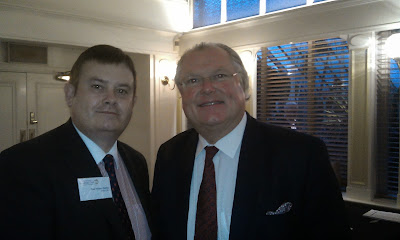Effective networking: develop your
skills, enhance confidence and create wider business opportunities – joint
event with CIPD
Networking
is a key link to enable joint action and collaboration with other businesses
and professionals, as well as improving internal communication within your own
organisation. However, networking brings
with it a host of fears and concerns and bad practice.
This
workshop on networking is dynamic, funny and highly participative. It addresses
some of the difficulties of networking, gives you skills to join groups and
people with ease, develop effective small talk, ask the right business
questions, escape from the rude or boring person, spot the opportunity and deal
with it in the right way and finally follow up effectively and confidently.
Learn
about the preparation and planning, how to answer the question ‘What do you
do?’ and how to represent yourself and your organisation at any function, at
anytime with anybody.
Networking
for the minority is fun, for the rest of us it can be pretty daunting and
scary. This talk will help you understand why and how you can use it to your
advantage to develop your contacts.
Date: 27 February 2014
Time:
6.30pm for 7.00pm
Location: DeVere Wychwood Park Hotel, Crewe CW2 5GP
Price: No
charge - Buffet served on arrival - all guests welcome
Booking
details: email
Julie.witts@cimaglobal.com
to book your free place
Speaker Details
Sue
Tonks is an international speaker and extremely experienced trainer with an
unmistakable style.
She has
had 20-years’ experience in leadership and management development with blue
chip companies such as Compass Group, Adidas, Manchester United, Baker Tilly,
Clydesdale and Yorkshire Bank and Co- Operative Pharmacy group.
Sue has
run her own business leadership and management training company for ten years
following her experience in many industry sectors such as logistics, travel and
tourism, catering and facilities management, sales, HR and local government.
Her key
note talks on business and networking bring realism, comedy and a practicality
which will stay with you forever.
Testimonials: -
LONDON BUSINESS SCHOOL MBA
PROGRAMMES 2011
“Sue's
session was wonderful, it has given me the confidence to appear at high level
business events with confidence.”
H E BUSINESS DEVELOPMENT PROGRAMME -
PRAXIS - LOUGHBOROUGH UNIVERSITY 2011
“I need
to get more from this woman! Amazing!”
“The
session I was dreading the most, and the one I needed most. In the end, it was
brilliant. I thoroughly enjoyed it and learnt loads!!”
“Sue is
fantastic and it would have been good to have a longer session for her.
Everyone struggles with networking.”
“Amazing
– excellent tips/content. Fantastic speaker – so engaging and so helpful.”
DURHAM UNIVERSITY MBA BUSINESS
SCHOOL 2010
“It's a
fantastic workshop. I learned a lot about how to network effectively and
confidently. When I next take this kind of event, I will deal with it easily
and freely”
“Definitely
recommend others, especially who are not from the UK.”
FORBES SOLICITORS
“An
excellent training session, well delivered covering an interesting array of
information with some great networking tips.”
OTHER RECOMMENDATIONS: -
“This is
just to say that Sue Tonks’ training event yesterday on networking was just
brilliant. Full of practical advice on every bit of the networking process, as
well as enormous fun!”
“I am no
longer apprehensive about going into a room of people to network, and it’s
entirely due to yesterday’s training. Elizabeth”
“I'm
very grateful to Sue Tonks for sharing her vast experience on this subject.
Before attending, I imagined it would be similar to the education slots at my
local BNI, but this seminar was altogether far more detailed and more enjoyable
than anything I'd encountered before. What really impressed me was how Sue able
to deliver so much information with such incredible humour and professionalism
- Peter Faulkner”
“What
can I say? Yesterday was fabulous. I can honestly say that this was one of the
most enjoyable training courses I have ever had the privilege to attend. Sue is
an inspiration. Her delivery style is so entertaining whilst still being very
informative. Our business is about building relationships, understanding people
and encouraging people to know, like and trust us. Sue's workshop demonstrates
all of these requirements in spades - Terri Cope”











